Add this eBook to your basket to receive access to all 159 records. Our indexes include entries for the spelling bailie. In the period you have requested, we have the following 159 records (displaying 1 to 10): These sample scans are from the original record. You will get scans of the full pages or articles where the surname you searched for has been found. Your web browser may prevent the sample windows from opening; in this case please change your browser settings to allow pop-up windows from this site. Inhabitants of Suffolk
(1524)
The lay subsidy granted by Act of Parliament in 1523 was a tax on the laymen (as opposed to clergy), levied on householders, landowners, those possessing moveable goods worth £1 or more, and all workmen aged 16 or over earning £1 or more per annum. Real estate was taxed at a shilling in the pound; moveable goods worth £1 to £2 at fourpence a pound; £2 to £20 at sixpence a pound; and over £20 at a shilling in the pound. Wages were taxed at fourpence in the pound. Aliens were charged double; aliens not chargeable in the above categories had to pay a poll tax of eightpence. The records of the assessment for the county of Suffolk, mostly made in 1524, survive in 64 rolls in the National Archives. From 42 of these a compilation for the whole shire was printed in 1910 as Suffolk Green Book x. This includes a list of defaulters of 1526 and a subsidy roll of 1534 for Bury St Edmunds. | Sample scan, click to enlarge

| Militia in Keynsham hundred, Somerset
(1569)
A muster of the ablemen, gunners, light horsemen, pikemen, archers and billmen available from this hundred, compiled by sir Hugh Paulet, sir Maurice Barkeley, sir Ralph Hopton and John Horner in answer to a royal commission of the 11th year of queen Elizabeth. The returns are arranged by tithing. The hundred consisted of the parishes of Brislington, Burnett, Chelwood, Compton Dando, Farmborough, Keynsham, Marksbury, Nempnett, Thrubwell, Pensford St Thomas, Priston, Purslow, Queen Charleton, Saltford, Stanton Drew, Stanton Prior and Whitchurch (Felton), near Bristol. (The sample shown is from the return for the borough of Axbridge) | Sample scan, click to enlarge
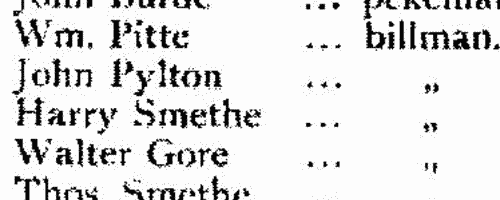
| Liegemen and Traitors, Pirates and Spies
(1571-1575)
The Privy Council of queen Elizabeth was responsible for internal security in England and Wales, and dealt with all manner of special and urgent matters
| Sample scan, click to enlarge

| Liegemen and Traitors, Pirates and Spies
(1578-1580)
The Privy Council of queen Elizabeth was responsible for internal security in England and Wales, and dealt with all manner of special and urgent matters
| Sample scan, click to enlarge
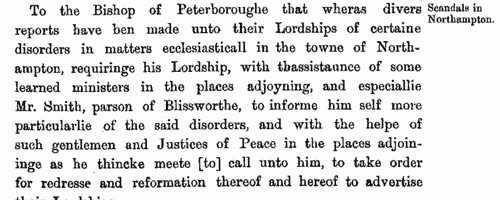
| Scottish litigants, rebels and cautioners
(1585-1592)
The Privy Council of Scotland exercised a superior judicial authority in the kingdom, and consequently received and dealt with a constant stream of petitions, as well as dealing with the internal security of the state. This register of the council from 1 August 1585 to 31 July 1592, in the reign of king James VI, was edited by David Masson, and published under the direction of the Lord Clerk Register of Scotland in 1881. Some of the individuals mentioned are the complainants, those of whom they complained, and the sureties on both sides: at this period, some of the complainants are alleging serious attacks, often of a feuding nature. Many of the bonds entered into by the cautioners are promises to keep the peace towards such enemies. Failure to answer to the council when summoned was a serious contempt, leading to being denounced a rebel, with serious consequences. But 'horning' was also used in the pursuit of debts: there was no imprisonment for debt in Scotland, but a creditor could have an obstinate debtor ordered, in the sovereign's name, to pay what was due, failing which, the debtor could be put to the horn, denounced as a rebel, and imprisoned as a rebel. The main text (to page 774) is from the Acta Secreti Concilii, containing the minutes of the Privy Council, with intermixed Acta Proper (political edicts), Decreta (judicial decisions), Acta Cautionis (acts of caution) and Bands (registration of bonds). After that are printed some miscellaneous Privy Council documents from the same years: additional acts of caution (775-778); ordinances and acts anent the Borders and the North (779-814); and miscellaneous privy council papers (815-834). The sources most productive of names, the Acta Cautionis and Registration of Bands, are also the most repetitive in form, and are not transcribed verbatim and literatim: nevertheless, one of the editor's rules was for 'All proper names and names of places occurring in the originals to be preserved in the abstracts without exception, and in the exact original spelling.'
| Sample scan, click to enlarge

| London Inquisitions Post Mortem
(1577-1603)
Full and complete abstracts of inquisitions post mortem for the City of London in this period. These are inquiries as to the real estate and heir of each person holding in capite or in chief, i. e. directly, from the Crown. The precise date of death of the deceased and the age and relationship of the heir are usually recorded. This index covers all names mentioned, including jurors, tenants, &c. This abstract also includes a handful of earlier items omitted from previous volumes. | Sample scan, click to enlarge
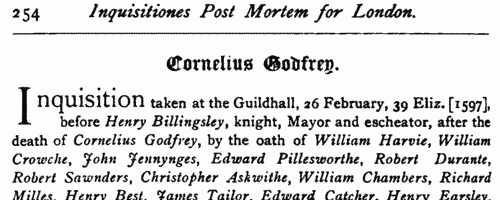
| Inhabitants of Manchester
(1604)
The Court Leet and View of Frankpledge of the manor of Manchester in Lancashire was held twice a year on the first Thursdays after Easter and Michaelmas. The record of each court starts with a list of the jurors, and then records the deaths of tenants and burgesses, with the names of their heirs, who were to do suit to the court; and transfers of burgages by sale, and homage of new burgesses. Then there are presentments of all manner of minor enroachments and misdemeanours, such as blocking of ditches, stopping of highways, noisome drains, &c. Finally there are new general ordinances, often with the appointment of officers to see that they are enforced. Every Michaelmas saw the swearing in of a long list of officers for the coming year, including the borough reeve, constables, market lookers, mise layers and gatherers, sealers of leather, officers for fruit and wholesome bread and (the prevention of) football, aletasters, bylawmen (burleymen), scavengers, (ap)praisers, catchpole, swineherd, and also the affeerers, who judged the fines to be levied by the court. The sample scan is taken from 1597. This index covers the court of 2 October 1604, with an adjournment to 9 October 1604. | Sample scan, click to enlarge
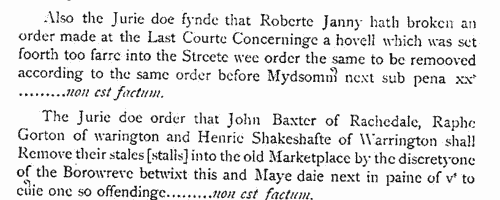
| Inhabitants of Manchester
(1612)
The Court Leet and View of Frankpledge of the manor of Manchester in Lancashire was held twice a year on the first Thursdays after Easter and Michaelmas. The record of each court starts with a list of the jurors, and then records the deaths of tenants and burgesses, with the names of their heirs, who were to do suit to the court; and transfers of burgages by sale, and homage of new burgesses. Then there are presentments of all manner of minor enroachments and misdemeanours, such as blocking of ditches, stopping of highways, noisome drains, &c. Finally there are new general ordinances, often with the appointment of officers to see that they are enforced. Every Michaelmas saw the swearing in of a long list of officers for the coming year, including the borough reeve, constables, market lookers, mise layers and gatherers, sealers of leather, officers for fruit and wholesome bread and (the prevention of) football, aletasters, bylawmen (burleymen), scavengers, (ap)praisers, catchpole, swineherd, and also the affeerers, who judged the fines to be levied by the court. The sample scan is taken from 1597. This index covers the court of 1 October 1612. | Sample scan, click to enlarge
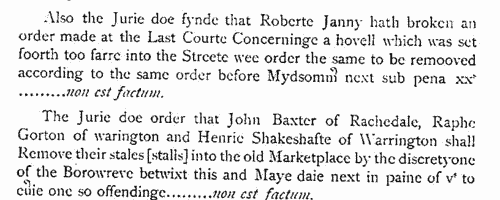
| Liegemen and Traitors, Pirates and Spies
(1618-1619)
The Privy Council of James I was responsible for internal security in England and Wales, and dealt with all manner of special and urgent matters
| Sample scan, click to enlarge
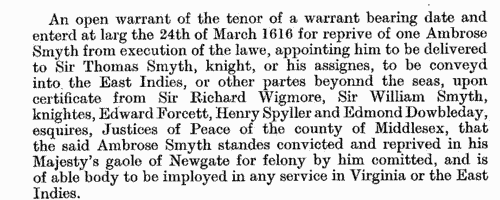
| Official Papers
(1627-1628)
The State Papers Domestic cover all manner of business relating to Britain, Ireland and the colonies, conducted in the office of the Secretary of State as well as other miscellaneous records.
| Sample scan, click to enlarge

|
Research your ancestry, family history, genealogy and one-name study by direct access to original records and archives indexed by surname.
|











